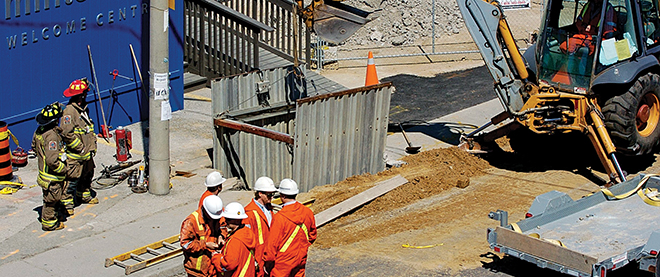Why municipal governments are winning the race to the bottom
Mayors and city councillors are running away with the title of ‘most incompetent’
Photo by Tibor Kolley
Share

Canada seems to be in the midst of a competition between different levels of government to see which is the most incompetent and costly to taxpayers. It’s a game with no winners.
The Senate expense-account scandal clearly poses a serious blow to the reputation of the federal government. That Prime Minister Stephen Harper once campaigned on greater accountability of public funds and meaningful reform of the Senate makes the situation doubly distressing.
The financial mess in Ontario—driven almost entirely by the policies of former premier Dalton McGuinty, including a foolish green-energy scheme, as well as unaffordable university-tuition rebates and all-day kindergarten—makes an equally strong case for provincial government incompetence. So does Quebec’s small-minded attacks on minority rights.
Yet the most distressing news of all surely comes from our country’s lowest level of government. Evidence of corruption throughout Montreal’s public construction industry continues to pile up. In Laval, the third-largest city in Quebec, long-time mayor Gilles “the Monarch” Vaillancourt faces unprecedented gangsterism and fraud charges for his alleged role in running the city like a criminal organization. And last week, the city suffered the further embarrassment of being placed in trusteeship by the province following allegations the interim mayor may also have been involved in illegal fundraising. (See “Fall from grace” here.)
In Toronto, civic politics have come to a near-standstill following allegations of illegal drug use by Mayor Rob Ford. And Saint John, N.B., was rocked by recent guilty pleas from former city councillor Donnie Snook to numerous counts of sexual assault and child pornography involving more than a dozen boys; some of the crimes occurred while he was an elected official.
Beyond all the outrageous personalities and deplorable incidents plaguing municipalities, however, there’s also ample evidence Canadians everywhere are simply paying too much for their local government.
This past weekend, the Federation of Canadian Municipalities held its annual meeting in Vancouver. It featured, as always, demands that federal and provincial taxpayers cough up more money for cities. This year, the call was for a national housing strategy. “Canada’s tax system continues to take too much from our cities and communities and put too little back,” declared FCM president Karen Leibovici, an Edmonton city councillor.
Yet a research report also released last week suggests Canada’s cities have a spending problem, not a revenue problem. According to the Canadian Federation of Independent Business, between 2000 and 2011, inflation-adjusted municipal operating expenses—excluding capital costs such as bridges and water plants that can vary widely from year to year—grew nationwide by 55 per cent. Over the same period, population growth was a mere 12 per cent.
Looking more closely at the biggest cities in Canada, CFIB data reveal a 79 per cent real operating spending growth rate in Calgary over the past dozen years, compared to a 27 per cent boost in population. Vancouver doubled its inflation-adjusted operating spending, while its population grew by just 15 per cent. Toronto was up 40 per cent, with eight per cent growth in population.
A large part of this divergence between population and spending is driven, according to the CFIB, by the rate of growth in unionized municipal salaries and benefits. The gap between comparable occupations in the municipal and private sectors can be as high as 42 per cent. Merely holding wages, salaries and benefits at private sector levels could have freed up $1.3 billion in spending in Toronto and almost a billion dollars in Montreal in 2011 alone.
And where local taxpayers expect their municipal governments to focus efforts on basic tasks such as keeping roads serviceable and parks mowed (which should keep operating expenses reasonably in line with population growth), municipal politicians habitually lose sight of these core objectives, in their preoccupation with national strategies, pet projects and other distractions.
Consider recent events in Calgary. A miscalculation on municipal tax bills led to an overpayment by Calgary taxpayers of $52 million on their provincial education taxes this year. Rather than simply rebate the money, as is the obvious and fair thing to do, Calgary Mayor Naheed Nenshi turned the process into something akin to reality television. He assigned five aldermen to advocate five different uses for the money—ranging from more transit spending to refurbishment of older neighbourhoods—and got former Dragons’ Den star W. Brett Wilson to MC the event. Next month, Calgary will make its final decision on what to do with the money it shouldn’t have.
Less fun but equally disconcerting, Metrolinx, the transit authority for the Greater Toronto and Hamilton metropolitan area, recently declared it wants a province-wide one percentage point increase on the province’s HST to pay for its $34-billion subway and light-rail expansion plans. This means Ontarians living elsewhere would face a higher tax rate simply for the convenience of Toronto. It is patently unfair.
In the race to decide which level of government is the most incompetent, municipalities are in danger of running away with the title. And if they want to live up to their claim to being the level of government closest to voters, they should learn to live within their means. It’s what everyone else is doing.